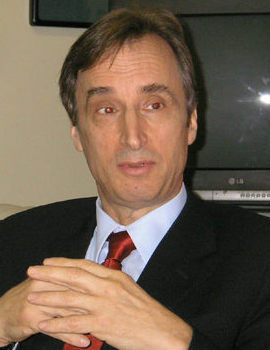 |
|
Dr. Stephen Linton
|
Eugene Bell Foundation now supplies one-third of N.K. population
It has been 10 years since the Eugene Bell Foundation started to provide medical support for North Koreans. The nonprofit organization began to support the shipment of medical supplies to tuberculosis centers and hospitals across the communist nation in1996. Dr. Stephen Linton (Korean name In Se-ban), chairman and founder of the foundation, says that the work his organization has done during the past decade was difficult. Stephen Linton, whose great-grandfather began medical and missionary work in South Korea 105 years ago, was a professor teaching Korean studies. He first launched his campaign to provide humanitarian aid to North Korea when he was giving lectures to international aid organizations in 1995, as at the time, North Korea was suffering from a serious food shortage. Because Linton had suffered from tuberculosis twice in childhood, he tried to extend practical help to North Korean patients of the disease. Tuberculosis is highly virulent, and North Korean patients were dying from the disease at the time, having been neglected owing to the food shortage and paralyzed medical system. Under Linton's system, his organization purchases drugs and other medical supplies with money donated by sponsors in South Korea and the United States, and he directly delivers them to North Korea after affixing the sponsors' names on them. The four-member foundation, which is in charge of bringing supplies to a third of the North Korean population, has provided drugs and medical equipment for more than 200,000 poeple for the past decade, while the World Health Organization (WHO) has taken charge of supplying the remaining two-thirds of the population. The Eugene Bell Foundation has brought changes to North Korean authorities, as they have lowered barriers that at first impeded his foundation's work. "At first, I couldn't enter hospitals, couldn't meet patients and I only saw empty hospital buildings. But now, I visit nursing homes in rural areas, meet patients and can confirm how they use drugs and medical equipment,'' he said.He was allowed to begin extending aid to North Korean general care hospitals beginning five years ago, having supplied it to only specialty tuberculosis clinics and wards prior to that. He has sent emergency medical instruments on the request of the North Korean authorities, and he has displayed health business for pregnant women and children. He stresses, "I am just a donkey that delivers the South Korean peoples' heart and good wishes to their North Korean brothers.'' Dr. Linton founded Saemsori, an aid group, to ease the pain felt by separated family members living in the United States. He is trying to get a North Korea aid-related law heard in U.S. Congress. On November 4-18, when the South-North exchanges were stalled owing to the North Korean nuclear test, Linton returned to Seoul after delivering medical supplies to 19 medical facilities in North Korea. In connection with the stopped rice and fertilizer aid from Seoul to Pyongyang since the July nuclear crisis, he said, "It is necessary for aid activities to be more transparent and more practical,'' and expressed his hope that at least fertilizer might be able to be provided to North Korea by the South Korean government again in the near future. Please direct questions or comments to [englishhani@hani.co.kr]





